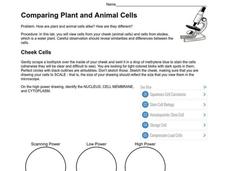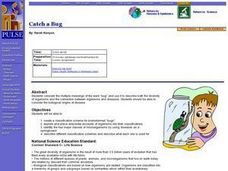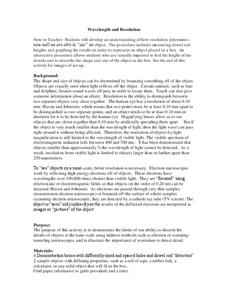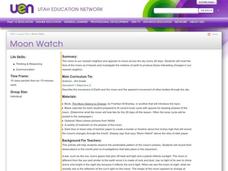Curated OER
Special Senses
In this special senses worksheet, 9th graders briefly describe the structure of a taste bud and the pathway a signal takes to the brain. Then they list the five basic taste sensations and homeostatic values of taste. Students also...
Curated OER
Comparing Plant and Animal Cells
For this comparing plant cells and animal cells worksheet, students view cells from their cheeks and cells from elodea. A Venn diagram reveals similarities and differences between the cells.
Curated OER
Loggerhead Turtle Fun Facts
Young scholars study loggerhead turtles and learn facts about reptiles. In this turtles lesson plan, students read information about loggerhead turtles and study their various sections and characteristics. Young scholars then make their...
Curated OER
The Beautiful Moon: Story and Comprehension
In this beautiful moon: story and comprehension activity, 3rd graders read a one passage about moon facts, then answer 5 multiple choice questions, with answer key provided.
Curated OER
Techno Movie
Students explore storytelling by using video editing software. In this movie making lesson, students identify the uses of PowerPoint and create a story using a digital camera which takes stills or video. Students combine this footage...
Curated OER
The 35mm Camera Lesson
Ninth graders explore the 35mm camera. They discuss and identify the various parts and characteristics of the 35 mm camera. Students examine the two aspects of a 35 mm camera that control the light.
Curated OER
Arsenic and Human Health
Ninth graders concentrate on arsenic poisoning as an example of the connections among health, geography, and geology as they develop a persuasive presentation about the dangers of arsenic in the drinking water, targeting a specific...
Curated OER
Altering Climate in the Classroom
Students experiment with moderating temperature extremes in the classroom. They experiment with ways to vent and block air.
Curated OER
Wavelength And Resolution
Pupils perform a simulation of the workings of an electron microscope to discover that the resolution will need to improved to detect objects in the nano-scale. They use wooden dowels as detectors to determine the shape of objects in...
Curated OER
Spectral Surprise
Young scholars experience a model that produces, separating, and displaying spectral colors.
Curated OER
Photosynthetically Available Radiation (PAR) Measurements Part 1: Calculating the Solar Constant using a TI-8
Twelfth graders are introduced to the term Photosynthetically Available Radiation. In groups, they participate in an experiment to determine how ecosystems survive the conditions in the Arctic. They calculate the amount of solar energy...
Curated OER
What Shape Is It?
Students predict the shape of an unknown object by bouncing a ball on it. For this physics lesson, students relate this activity to how dolphins use echo-location to navigate. They analyze their lab result and discuss findings.
Curated OER
Physics- global warming
Students discuss the concept of global warming and view a multimedia clip on the global warming phenomenon. They statistically analyze mean temperature data and compare a given set of data. Data on atmospheric CO2 is done then they...
Curated OER
and and Ocean Views of Earth by Remote Sensing
Students explain how satellites help scientists to see more than with the unaided eye and how Landsat technology works. Students identify vegetation and fire sites in the rainforest and detect erosion along rivers. They are able to use...
Curated OER
Blast's Cosmic Carnival
Students, after analyzing the history of a concentrator, model how a Genesis spacecraft concentrator works by playing a game. In groups of three or four, after being given materials to work with, are challenged to roll the rubber balls...
Curated OER
Sea Ice Research
Learners study sea ice and its importance in climate and climate change. They discuss sea ice as a presence of a food source for marine animals in the arctic and complete a lab activity. After completing the lab, they watch a video...
Curated OER
Moon Watch
Third graders read books about the moon and discuss its perceived changes as it moves across the sky. They observe the moon over the course of a month and chart their observations. They discuss their observations and conduct further...
Curated OER
How Hot Is It?
Sixth graders use paper cups, black and white lining, thermometers and plastic wrap to conduct an experiment that measures the energy-collecting capacity of various colors. They graph the results.
Curated OER
All The News
Students simulate newspaper critics in the topics of heat and temperature. They write a scientific critique of evidence and claims used in a newspaper article and research using KIE software. They write notes on the letter to the editor...
Curated OER
Chloroplasts and Pigments
In this plant pigments activity, students compare the function of 3 types of pigments: chlorophylls, carotenoids, and phycobilins. This activity has 23 fill in the blank, 3 drawing, and 2 short answer questions.
Curated OER
Moon WebQuest
Third graders research basic information about the moon and identify the phases and order of the phases of the moon. They conduct Internet research, complete a moon WebQuest, and write a magazine article about the moon using their...
Curated OER
With Liberty and Top Soil for All
Young scholars describe the need of plants to have water, soil and sunlight to grow. They use the scientific method when completing experiments. They identify the core democratic values that are needed for a democracy to grow and compare...
Curated OER
Physical Difference and Classification
Learners use a microscope and observation skills to compare and contrast several physical properties and develop a classification system.

























